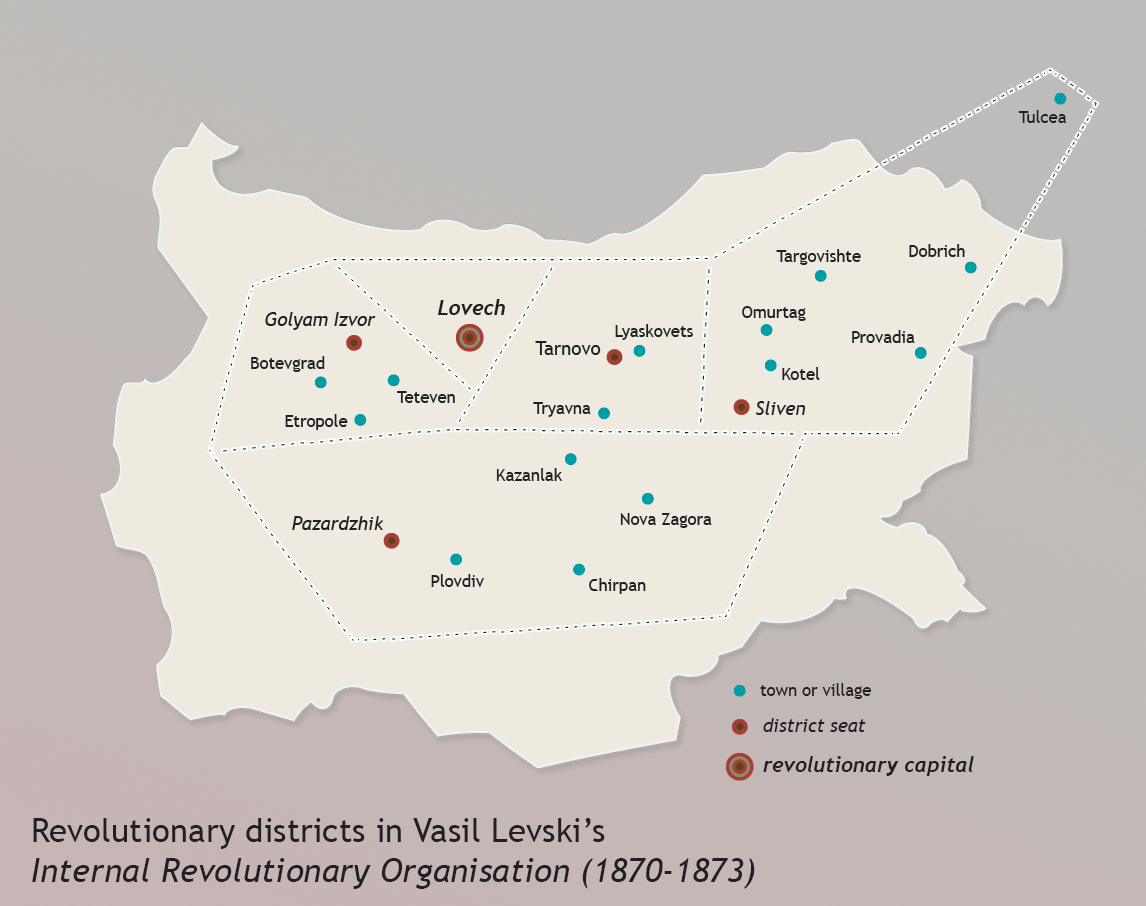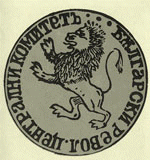Internal Revolutionary Organization on:
[Wikipedia]
[Google]
[Amazon]

 The Internal Revolutionary Organisation ( bg, Вътрешна революционна организация) or IRO was a Bulgarian revolutionary organisation founded and built up by Bulgarian revolutionary
The Internal Revolutionary Organisation ( bg, Вътрешна революционна организация) or IRO was a Bulgarian revolutionary organisation founded and built up by Bulgarian revolutionary
''Bones of Contention: The Living Archive of Vasil Levski and the Making of Bulgaria's National Hero''
Maria N. Todorova, Central European University Press, 2008, , PP. 276-278.
''The establishment of the Balkan national states, 1804-1920''
Volume 8, A History of East Central Europe, Barbara Jelavich, University of Washington Press, 1986, pp. 136-137 {{DEFAULTSORT:Internal Revolutionary Organization Bulgarian revolutionary organisations Revolutionary organizations against the Ottoman Empire Bulgarian National Revival

 The Internal Revolutionary Organisation ( bg, Вътрешна революционна организация) or IRO was a Bulgarian revolutionary organisation founded and built up by Bulgarian revolutionary
The Internal Revolutionary Organisation ( bg, Вътрешна революционна организация) or IRO was a Bulgarian revolutionary organisation founded and built up by Bulgarian revolutionary Vasil Levski
Vasil Levski ( bg, Васил Левски, spelled in old Bulgarian orthography as , ), born Vasil Ivanov Kunchev (; 18 July 1837 – 18 February 1873), was a Bulgarian revolutionary who is, today, a national hero of Bulgaria. Dubbed t ...
in the period between 1869 and 1871. The organisation represented a network of regional revolutionary committees which were governed by a Central Committee in the town of Lovech
Lovech ( bg, Ловеч, Lovech, ) is a city in north-central Bulgaria. It is the administrative centre of the Lovech Province and of the subordinate Lovech Municipality. The city is located about northeast from the capital city of Sofia. Near ...
. The foundation of IRO reflected Levski's ideas that the centre of revolutionary activity be transferred from the Bulgarian emigrant circles in Romania
Romania ( ; ro, România ) is a country located at the crossroads of Central Europe, Central, Eastern Europe, Eastern, and Southeast Europe, Southeastern Europe. It borders Bulgaria to the south, Ukraine to the north, Hungary to the west, S ...
to Bulgaria proper. In 1871, Levski prepared the Charter of the organisation in the spirit of his own political views: liberation of Bulgaria from the Ottomans
The Ottoman Turks ( tr, Osmanlı Türkleri), were the Turkic founding and sociopolitically the most dominant ethnic group of the Ottoman Empire ( 1299/1302–1922).
Reliable information about the early history of Ottoman Turks remains scarce, ...
through a nationwide revolution and establishment of the country as a democratic republic with guarantees for the equality of all of its citizens regardless of their ethnicity or religion.
By the end of 1872, both Levski and Lyuben Karavelov, the chairman of the Bulgarian Revolutionary Central Committee
The Bulgarian Revolutionary Central Committee ( bg, Български революционен централен комитет, ''Balgarski revolyutsionen tsentralen komitet'') or BRCC was a Bulgarian revolutionary organisation founded in 186 ...
(BRCC), which was situated in Bucharest
Bucharest ( , ; ro, București ) is the capital and largest city of Romania, as well as its cultural, industrial, and financial centre. It is located in the southeast of the country, on the banks of the Dâmbovița River, less than north o ...
, had figured out that the future success of the armed struggle against the Ottomans depended on the co-operation of both: external and internal committees. To this end, the two organisations prepared and adopted a joint programme and charter and voted on the merger of the two organisations under the name of BRCK at a general meeting held in Bucharest
Bucharest ( , ; ro, București ) is the capital and largest city of Romania, as well as its cultural, industrial, and financial centre. It is located in the southeast of the country, on the banks of the Dâmbovița River, less than north o ...
in May, 1872. The goals and fundamental principles which governed the work of the Internal Revolutionary Organisation influenced the formation and guiding principles of subsequent Bulgarian revolutionary organisations, namely the Internal Macedonian-Adrianople Revolutionary Organisation (active in the Ottoman Empire from 1893 to 1912), the Internal Macedonian Revolutionary Organisation (active in Greek and Yugoslav Macedonia from 1919 to 1934), the Internal Thracian Revolutionary Organisation (active in Western Thrace
Western Thrace or West Thrace ( el, �υτικήΘράκη, '' ytikíThráki'' ; tr, Batı Trakya; bg, Западна/Беломорска Тракия, ''Zapadna/Belomorska Trakiya''), also known as Greek Thrace, is a geographic and historica ...
from 1922 to 1934), the Internal Dobrudjan Revolutionary Organisation (active in Dobruja
Dobruja or Dobrudja (; bg, Добруджа, Dobrudzha or ''Dobrudža''; ro, Dobrogea, or ; tr, Dobruca) is a historical region in the Balkans that has been divided since the 19th century between the territories of Bulgaria and Romania. I ...
from 1923 to 1940) and the Internal Western Outland Revolutionary Organisation (active in the Western Outlands
The Western (Bulgarian) Outlands () is a term used by Bulgarians to describe several regions located in southeastern Serbia.
The territories in question were ceded by Bulgaria to the Kingdom of the Serbs, Croats and Slovenes in 1920 as a resul ...
from 1921 to 1934).
See also
*Bulgarian Revolutionary Central Committee
The Bulgarian Revolutionary Central Committee ( bg, Български революционен централен комитет, ''Balgarski revolyutsionen tsentralen komitet'') or BRCC was a Bulgarian revolutionary organisation founded in 186 ...
* Macedonian Secret Revolutionary Committee
* Vasil Levski
Vasil Levski ( bg, Васил Левски, spelled in old Bulgarian orthography as , ), born Vasil Ivanov Kunchev (; 18 July 1837 – 18 February 1873), was a Bulgarian revolutionary who is, today, a national hero of Bulgaria. Dubbed t ...
References
Sources
*''Historical dictionary of Bulgaria'', Item 46 of European historical dictionaries, Scarecrow Press, Inc., 2006, , p. 228.''Bones of Contention: The Living Archive of Vasil Levski and the Making of Bulgaria's National Hero''
Maria N. Todorova, Central European University Press, 2008, , PP. 276-278.
''The establishment of the Balkan national states, 1804-1920''
Volume 8, A History of East Central Europe, Barbara Jelavich, University of Washington Press, 1986, pp. 136-137 {{DEFAULTSORT:Internal Revolutionary Organization Bulgarian revolutionary organisations Revolutionary organizations against the Ottoman Empire Bulgarian National Revival